Why melon tastes bitter and can it be eaten
The season of sugar melons is the time many people look forward to summer for. And the greater the disappointment when you feel bitterness instead of honey. There are several reasons for the unusual taste of the melon, ranging from mistakes in plant care and ending with varietal characteristics.
In this article, we will tell you why melon tastes bitter, is it possible to eat it and how to avoid buying such fruits.
The content of the article
Reasons for the bitter taste of melon
The main reason for the bitter taste of the melon pulp is the mistakes made during its cultivation. The taste deteriorates due to various diseases or the content of undesirable substances in the fruit. Also, certain varieties of melons do not have a sweet taste.
Varietal features
The bitterness in a melon does not always mean that it is a spoiled fruit. A separate variety is also called bitter melon - the Indian relative of our usual one. Momordica, otherwise Indian cucumber or Chinese melon, also belongs to the pumpkin family, but is in a different genus.
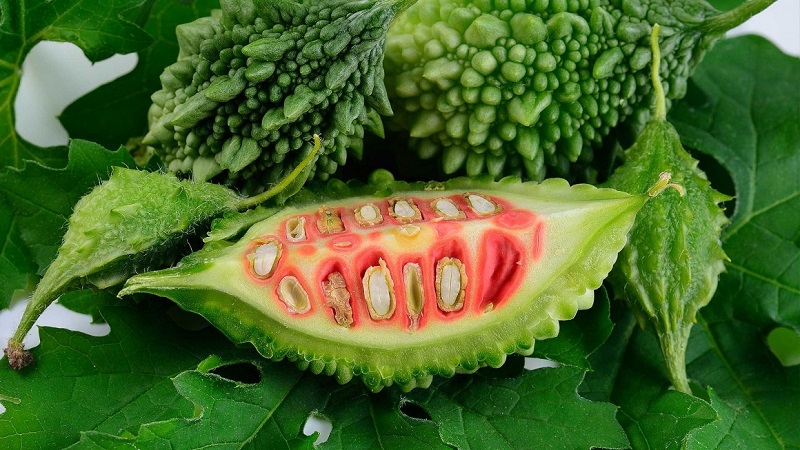
Reference. Momordicus translated from Latin means prickly, biting. This name was given to the culture, since before ripening all parts of the plant are stinging, like nettles.
Summer residents fell in love with Momordica for its decorative effect. The plant is a liana with beautiful large leaves, with green fruits, which turn orange when ripe.
Bitter taste is normal for Momordika, the fruit itself and its seeds are bitter. However, it is used in Asian dishes and oriental medicine. Only unripe green fruits are used for food.
The pulp of unripe Momordika is eaten raw, boiled, fried, canned. The matured plant is most often used in traditional medicine.
Growing errors
Since melon is a thermophilic plant, it is important to take climatic conditions into account when planting. When grown in cold regions, fruits need special attention and proper care.
In the northern part of the country, seedlings are not used for planting on the garden. Melon seeds are soaked in warm water, then planted in separate cups, in a special soil for seedlings of melons. It contains soil, humus and fertilizers. In cold regions, the plant is planted indoors.
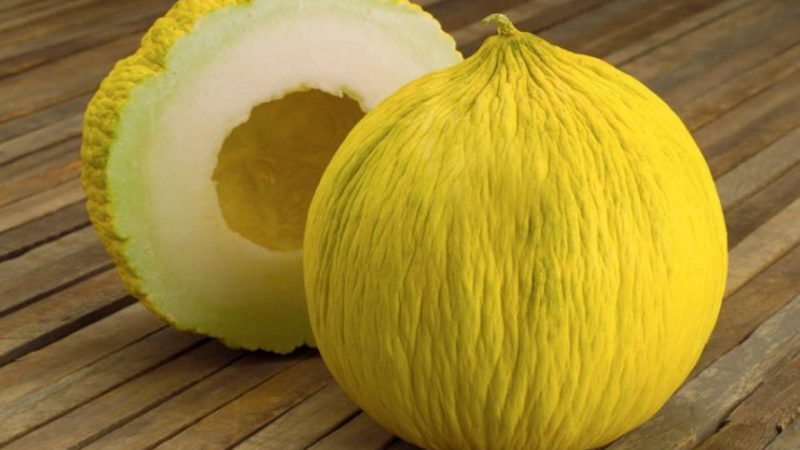 Cold and high moisture content of the soil causes significant damage to the crop. The seedlings of the plant grow well at a temperature of + 25 ° C and a humidity of 60-70%. The site for planting melons and gourds is sunny, without drafts. After the soil warms up to + 18 ° C, the seedlings are planted in open or closed ground.
Cold and high moisture content of the soil causes significant damage to the crop. The seedlings of the plant grow well at a temperature of + 25 ° C and a humidity of 60-70%. The site for planting melons and gourds is sunny, without drafts. After the soil warms up to + 18 ° C, the seedlings are planted in open or closed ground.
Diseases
Like most plants, melons are at risk of contracting various diseases if not cared for properly.
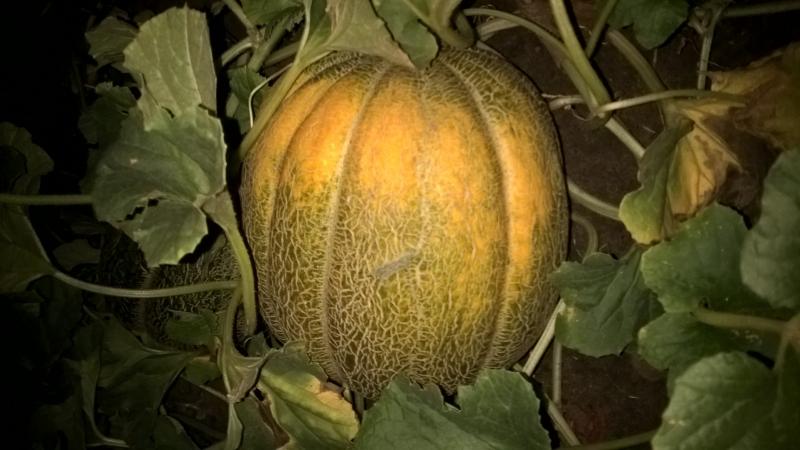
Fusarium
Under unfavorable growing conditions, there is a high risk of infection of the fetus with this fungal disease. Although modern breeders develop plants that are resistant to fusarium, there are still susceptible to the fungus.
There are several ways a melon can become infected - through infected seeds, through the root system, or through cracks and scratches on the skin surface.
Signs of fusarium:
- too light leaves;
- lethargy of stems and leaves;
- gray spots on the leaves.
The taste of a fruit affected by the fungus will be bitter and the fruit in general will lose its palatability. Therefore, diseased plants are destroyed, and the soil is treated with a fungicide.
Reference. Planting in tall beds reduces the risk of disease and pest infestation.
Ankaroz
This type of fungus also gives the fruit a bitter taste. Basically, ankarose melon visually looks normal, but when cut, the flesh around the seeds and the seeds themselves are unpleasant brown. On the fruit itself, brownish spots are visible, located over the entire surface.
Reference. China grows a quarter of the world's melon production - about 8 million tons.
Nitrate content
When potassium, calcium and ammonium are chemically combined, nitrates are formed. They are often used on large farms as plant fertilizers. In small quantities, nitrates are used to enhance growth, pest control and for long-term storage of fruit.
But their overuse leads to negative consequences. This chemical compound accumulates in the melon pulp, gives an unpleasant taste and causes digestive problems in humans.
Reference. When melons are grown near the road, there is a risk of unpleasant tasting crops, as the fruits absorb heavy metals and chemical compounds from the exhaust gases.
Can melon be eaten if it tastes bitter
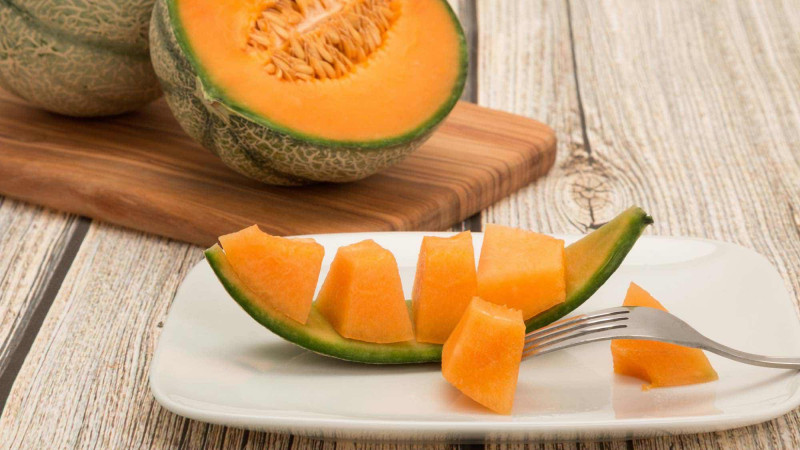
It is believed that if the pulp of the fruit is partially bitter, then the rest with a normal taste can be included in the diet.
But if the melon tastes bitter, it is undesirable to eat it... In most cases, it is impossible to know the reason for the savory taste, so it is best to be careful. If the fruit contains a lot of nitrates or begins to deteriorate, a person will have serious problems with the gastrointestinal tract, up to and including poisoning.
The chemical composition of bitter melon
Sweet varietal representatives of melons have a rich chemical composition. They contain vitamins A, C, B vitamins, potassium, magnesium, beta-carotene, iron, cobalt... But the main indicator that affects the sweetness of a fruit is carbohydrates. The reduced content in the melon gives it bitterness.
It should be remembered that the chemical composition of the fruit depends not only on the soil, but also on the quality and quantity of fertilizers. Regular watering and air temperature also affect composition, including water content and sugar formation.
Reference. The sugar content in dessert varieties must be at least 13%, otherwise the melons will not be suitable for consumption.
Why melon seeds are bitter
The seeds are usually bitter in the variety Momordica... Due to their chemical composition, they are used in oriental folk medicine.
Seeds of Momordika strengthen blood vessels and have a beneficial effect on the kidneys, liver, heart, pancreas, but they should be used in moderation and with caution. If the seeds are abused, negative consequences are possible.
How to choose the right sweet melon without bitterness
Features when choosing a fruit are as follows:
- Ripe melon has a pronounced pleasant fruity-honey aroma. If there is no such smell or it is weak, it is better not to eat such fruit.
- The surface is smooth, without cracks, dents and scratches. Pathogens penetrate through such holes, which negatively affects the quality of the product.
- A dull sound is heard when tapped.
- The tail of a fresh fruit is dry, the skin is slightly springy when pressed with a finger.
Melon growing rules so that it does not taste bitter
Before starting cultivation, study the agricultural technology of melons. In cold regions, for example, melons are grown indoors. It is equally important to regularly water, loosen and feed the plant.
Water the melons with warm water about once a week, in the dry season - as the topsoil dries out. During the period when ovaries are formed, watering is increased. Before the formation of fruits, the volume of water, on the contrary, is reduced, which allows you to get a sweeter harvest. The soil is loosened after each watering, to a depth of no more than 12 cm.
After planting, the melon especially needs nutrients for the development of lashes and leaves. To do this, a week after planting, the plant is watered with a solution of ammonium nitrate (20 g per bucket of water), after two weeks it is fed with complex fertilizer. Wood ash is periodically added, which helps the fruit become sweeter.
Since melon is a thermophilic crop, it needs sufficient sunlight.
If there is a risk of infection of plants with fungi or other diseases on the land plot, it is pre-treated with special preparations. For example, potassium chloride is used to prevent fusarium, and Bordeaux liquid is used against ascochitis.
After this procedure, it is advisable to wait about two months, and only then plant the melons.
After planting, the plants are not treated with pesticides so as not to provoke changes in the fruits.
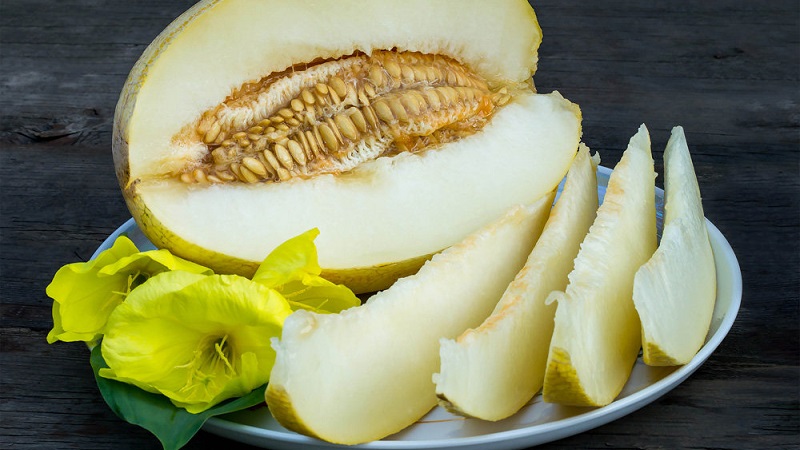
Read also:
Can melon be eaten with type 2 diabetes?
Uzbek autumn melon "Babushka".
The popular kolkhoznitsa melon: calorie content, benefits and harms to the body.
Conclusion
Melon tastes unpleasant due to varietal characteristics, but most often it tastes bitter due to errors in cultivation, nitrate content or past diseases. Since it is almost impossible to establish the cause, it is better to refuse the use of such fruits so as not to harm yourself.
In the garden, provide the plant with access to heat and light, do not forget to water, feed and protect from disease. And on the market, choose a melon with a honey aroma, an echoing echo and a whole, firm skin.